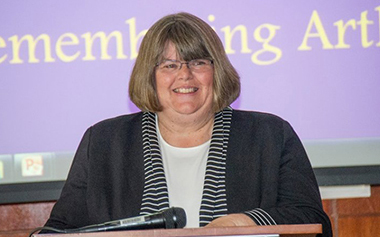5 Questions with Virginia Goatley

ALBANY, N.Y. (June 24, 2021) — On June 1, Virginia Goatley, professor in Literacy, Teaching & Learning, was appointed interim dean of the School of Education (SOE). A nationally recognized scholar whose research focuses on teacher preparation and professional development that supports effective classroom practices for literacy instruction, Goatley has served several SOE leadership roles, including associate dean for professional studies (2003-08), vice dean (2008-09) and chair of her department (2013-21).
A participant in national and statewide efforts for teacher education and preparation of literacy professionals, she has received many honors, including the Albert J. Kingston Service Award from the Literacy Research Association, the Charles C. Mackey Award from the New York Association of Colleges for Teacher Education, UAlbany’s Excellence in Faculty Academic Service and the Council Service Award from the NYS Reading Association.
If you weren’t teaching at a university, what would you be doing?
I would either be an archaeologist or own a bookstore. I always loved science and history courses and had the opportunity to travel across much of the United States, where the archaeologists really intrigued me. Within education, I focused on science and history courses in college, enjoying the research questions and possibilities associated with these disciplines. I still read a lot of history books about places, people, events that impact current times.
What’s your favorite class to teach?
ELTL 756 Texts and Teaching in Literacy Learning, a course for doctoral students. In this course, we explore the history of literacy instruction, connecting the research and theory that informs school-based practices. In the course, the students write a book review for publication. I enjoy mentoring them through the publication process — from drafting, submitting, revisions, and so forth. It is fun to support a student in their journey toward becoming a published author.
What do you see as challenges confronting the School of Education or education schools in general?
As we move forward from the pandemic, our challenge is to capitalize on the opportunity to collaborate with our stakeholders and colleagues across educational settings to support children, teenagers, adults and families. The School of Education hosts a diverse range of programs, including teacher preparation, counseling, school psychology, educational leadership, technology and so forth. We are fortunate to have faculty with expertise in many areas who collaborate across disciplines to support a wide range of educational areas, such as P-12, higher education and community settings.
What was your first job?
My first job, at 15, was an assistant at the local public library. I worked there throughout high school on various tasks such as finding books, shelving books and adding note cards to a large card catalogue — all well before digital options. The best part was running the summer reading program for the children in the community.
What’s one thing students or your colleagues might be surprised to know about you?
At one point, I coached girls middle school basketball. I enjoyed the opportunity to coach beginning players, drawing on my teaching expertise to coach a team sport. It was fun to see how much the team learned across the season, including development of their individual skills, my own coaching abilities and our ability to work together as a team.




